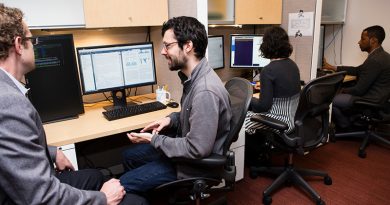
Part 1: Beyond AI Detection – Rethinking Academic Assessments
by Carie Cardamone, Associate Director for STEM, Professional Schools & Assessment
This is Part 1 of the series Addressing Academic Integrity in the Age of AI
Given the challenges that AI poses to traditional assessments, now is the time for each of us to rethink our assessment strategies to foster authentic student engagement. The following approaches can help an instructor create a transparent learning environment that emphasizes intrinsic motivation, deep understanding over performance, student agency, and human connections. While they are designed to reduce incentives to cheat (e.g., see Lang, Cheating Lessons, 2013), each is aligned with the promotion of deeper and more durable learning.
Help students understand course expectations and disciplinary norms
Use both the syllabus and discussions in class to communicate what is expected of students and why these expectations matter. Check in to make sure that students understand what constitutes plagiarism and other forms of cheating with-in your course, and share examples relevant to your discipline and assignments. For each assignment, clearly communicate which forms of assistance (e.g., AI, peers, etc.) are appropriate.
Increase intrinsic motivation through student choice and collaboration
Create opportunities for students to understand the relevance and value of their work, through collaborations with their peers. Providing students with the autonomy to relate assignments to their personal interests, future career paths, and the real world.
Prioritize learning over performance through iteration, feedback, revisions & reflections
Focussing students on the process of the development of their ideas and can help center the learning behind the activity. Structure assignments to provide students with frequent opportunities to check their understanding, and receive feedback on their ideas and iteratively improve their work. Reflections in which students articulate what they are learning, help them connect each stage of their learning to improvements in their work.
Reduce pressure and anxiety with frequent, low-stakes assessments
Use a variety of in-class activities, short writing assignments and quizzes to provide students with opportunities to retrieve knowledge and practice interleaving skills throughout the semester.
Build students self-efficacy with early success and self-assessment
Recognize that each student will enter your course with different skills and background knowledge and create opportunities to build their confidence and experience success early on. Guide them through the process of using self-assessment tools to evaluate their own work and build their skills to improve their learning throughout the semester.
Center Human Interactions and Connections
Creating a supportive community through students’ interactions with each other and the instructor is one of the best ways to build a positive learning environment. Group work, peer discussions, publicly sharing their ideas and receiving instructor feedback all help students see the value in what they are learning and doing. At Tufts, students can interact with writing consultants and research librarians to help students with their writing process and/or critically analyze suggestions coming from AI systems.
These approaches draw on fundamental theories of teaching & learning to increase the integrity of our assessments and mitigate academic dishonesty. They also build on the idea that true learning will always require human effort and engagement. For students to thrive in an increasingly AI-integrated world, educators need to equip our students with critical thinking skills and intellectual curiosity to participate in ethical scholarship, and navigate AI ethically and effectively as life-long learners.
Our findings strongly suggest that the “easy solution” for detection of AI-generated text does not (and maybe even could not) exist. Therefore, rather than focusing on detection strategies, educators continue to need to focus on preventive measures and continue to rethink academic assessment strategies.
Testing of detection tools for AI-generated text Webber-Wulff et al. December 2023
References
- Lang, J. M. (2013). Cheating Lessons. Harvard University Press.
- Mills, A. (2023).ChatGPT Just Got Better. What Does That Mean for Our Writing Assignments? The Chronicle of Higher Education.
- Weber-Wulff, D. et al. (2023). Testing of detection tools for AI-generated text. International Journal for Educational Integrity.
Return to the series Addressing Academic Integrity in the Age of AI
Image credit: Image generated by ChatGPT 4.0 via DALL-E



